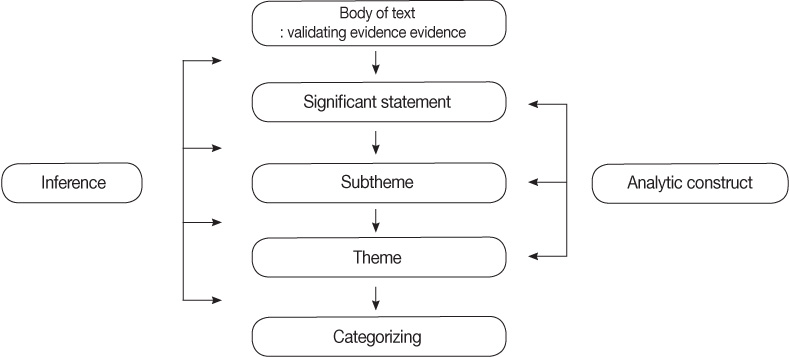J Korean Oncol Nurs.
2011 Feb;11(1):9-19.
Distress of the Patients with Ostomy
- Affiliations
-
- 1Kyungpook National University Hospital, Deagu, Korea.
- 2Yeungnam University Medical Center, Daegu, Korea.
- 3College of Nursing, Kyungpook National University, Deagu, Korea.
- 4School of Nursing, Kyungpook National University, Daegu, Korea. bychung@knu.ac.kr
Abstract
- PURPOSE
The purpose of this study was to explore and describe the distress of the patients with ostomy.
METHODS
A descriptive research design was adopted for data collection and analysis. Six patients with ostomy participated in the study. The consent from the participants was obtained for ethical protection. Data were collected from July 31, 2009 to January 10, 2010 using in-depth interview technique. Krippendorff's content analysis method was utilized for data analysis.
RESULTS
Eight categories and 26 themes were extracted from the data which illustrated the lived distress of the patients with ostomy. The categories were "do not have any freedom to eat whatever I wish to eat", "uncontrolled defecation", "have to live through tough situation", "keep stoma in suspense", "disgusting ostomy", "can not live with comfort", "easily take a pessimistic view", and "see how the wind blows in daily family life".
CONCLUSION
Ostomates were affected by the distress of having an ostomy in their physical, psychological, social and spiritual life. Individualized and continued nursing education program has to be developed in hospital and community settings in order to improve the quality of life of the ostomates.
Figure
Reference
-
1. Carpenito L. Nursing Diagnosis. Application to clinical practice. 1983. Phillidelphia: Lippincott.co.2. Kwon MH, Kim BH. A study on the symptom distress and suffering of five major cancer patients. J Korean Oncol Nurs. 2003. 3:145–154.3. Kim YO. Effects of home care services on discomfort in patients with cancer and on caregiver burden. [dissertation]. 2002. Seoul: Yonsei Univ..4. Lee KH. Post-operative morbidity, menopause symptoms and quality of life in patients with breast cancer. [dissertation]. 2006. Seoul: Yonsei Univ..5. Bae SH. A comparison of symptom distress and spiritual well-being of cancer patients according to the variable of illness and treatment. [dissertation]. 2006. Daegu: Keimyung Univ..6. 2008 Health Insurance statistiques Annual Report. Health Insurance Review & Assessment Service. Available at: http://www.hira.or.kr/common/dummy.jsp?pgmid=HIRAF 010304000000.7. 2008 Cancer Registry Annual Report. Ministry of Health & Welfare. Available at: http://www.mw.go.kr/front/al/sal0301vw.jsp?PAR_MENU_ID=04&MENU_ID=0403&BOARD_ID=140&BOAR D_FLAG=00&CONT_SEQ=225139&page=1.8. Kim HK. Health-related quality of life and its related factors in rectal Cancer. [dissertation]. 2003. Seoul: Yonsei Univ..9. Park HM, Ha NS. Influencing predictors of quality of life in colorectal cancer patients with colostomy. Clin Nurs Res. 2006. 12:123–131.10. Lee BS. A study on Self-esteem, social support and quality of life in ostomates. Nurs Sci. 2008. 20:37–49.11. Kim MS. Long-term survival experience of patients with rectal cancer. [dissertation]. 1996. Seoul: Chung-Ang univ..12. Choi KS. An ethnographic case study of an experience of a patient with rectal cancer through oral history. [dissertation]. 1995. Seoul: Seoul National Univ..13. Kim JH. Relationship among the body image, self-esteem, depression in patients with colostomy. [dissertation]. 2002. Seoul: Ewha Womans Univ..14. Mckenzie F, White CA, Kendall S, Finlayson A, Urquhart M, Williams . Psychological impact of colostomy pouch change and disposal. BJN. 2006. 15:308–316.
Article15. Krippendorff K. Content analysis: an introduction to its methodology. 2003. 2nd ed. Thousand Oaks, CA: Sage Publication, inc..16. Choi KS, Kim MS. A study on the difficulties and coping process of ostomates. J Korean Acad Adult Nurs. 1997. 9:297–312.17. Bae ES. The relationship between hardiness and self-care agency of persons with a colostomy. Korean J Rehabil Nurs. 2000. 3:15–26.18. Kim JS, Kwon YH, Choi SY, Yoon YH, Jin HJ, Lee GY, et al. A survey of nursing needs patients with colostomy. J Clin Nurs Res. 2001. 5:55–72.19. Park KH. Current activity status and prospects of wound ostomy continence nurses, Korean Acad Adult Nurs Autumn Meeting. 2002.20. Lee SH, Park EB. Current status of stoma researches in Korea. J Korean Soc Coloproctol. 2005. 21:57–63.21. Choi SI, Lee KY, Ko YG, Koh SH, Oh SM, Yoon C. Survey on satisfaction of ostomate according to colostomy irrigation. J Korean Soc Coloproctol. 2000. 16:193–197.22. Park SM, Kim CH, Hur HK, Kim GY. A descriptive study on development of an ALARM sexual counseling program for patients with ostomy. J Korean Acad Public Health Nurs. 2007. 21:46–56.23. Prieto L, Thorsen H, Juul K. Development and validation of a quality of life questionnaire for patients with colostomy or ileostomy. HQLO. 2005. 3:62–72.
Article
- Full Text Links
- Actions
-
Cited
- CITED
-
- Close
- Share
- Similar articles
-
- Development and Evaluation of a Web-based Ostomy Self-care Education Program
- Colorectal Cancer Survivors' Inner Strength, Multiple Identities, and Quality of Life by Gender and Ostomy Presence: A Cross-Sectional Study
- Living with a Colostomy: A Phenomenological Study
- Development of a home health care service platform for ostomy patient management
- vidence-Based Nursing Practice Guideline: Ostomy Care


